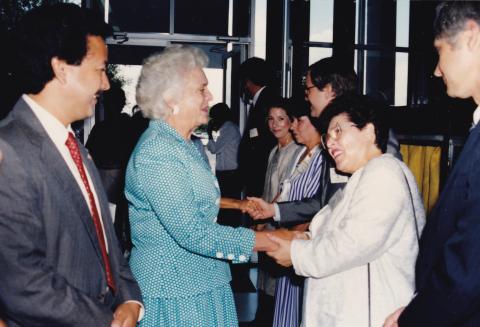
Meet Miguel Gonzalez, who graduated from the University of Texas at Austin in 1974 with a journalism degree. He has witnessed firsthand the remarkable evolution of the industry. In the ever-evolving landscape of journalism, he said the only constant is change. From the days of hot lead typesetting to the digital revolution reshaping the very fabric of news delivery, journalism’s journey is one of continual adaptation and innovation.
Gonzalez crafted his skills as a student at the Moody College of Communication (before it was even called Moody) and was also a staff writer for The Daily Texan. It was a time of profound change, both within the university and the broader field of journalism.
“Those were the years of Watergate,” Gonzalez recalled, his voice tinged with nostalgia. “Woodward and Bernstein, and Nixon and all that stuff.”
In the wake of the Watergate scandal, journalism emerged as a powerful force for accountability and transparency, inspiring a new generation of aspiring reporters to join the ranks of the Fourth Estate.
“The attendance skyrocketed," Gonzalez said. “Everybody wanted to be a journalist.”
After his graduation, Gonzalez secured a job at a television news station, where he served as a news reporter for three years. He then transitioned to working for Texas Southmost College as a director of media services, and later as a public information officer for 15 years. After his tenure in public relations, he began working in advertising.
“The writing that I learned in journalism school was what kept me in business, kept me working,” he said. “It helped me in my later careers. Whether it was crafting presentations, conducting interviews, or hosting my own radio show on FM radio where I engaged with local figures from politicians to school administrators and directors of nonprofits, the writing techniques I learned were instrumental. It wasn't just about meeting the press. It was about uplifting conversations and meaningful interactions.”
Born in an era where newspapers reigned supreme, Gonzalez witnessed firsthand the gradual shift toward digitalization.
“Believe me, the revolution from print to digital didn't come overnight,” Gonzalez said. “It took years because a lot of the newspapers were set in their ways.”
As technology advanced, so did the tools of the trade. From typewriters to word processors, from manual research to instant online access, journalists adapted to the changing times.
“I went from typing out hot lead to using an IBM Selectric typewriter,” Gonzalez said. “But now, I can't imagine being without my iPad or phone. They're essential tools in the digital age.”
The arrival of social media ushered in a new era of journalism where news travels at the speed of a click.
“Social media has made journalists more accountable,” Gonzalez said. “With the potential to reach millions instantly, accuracy and integrity are paramount.”
However, with great power comes great responsibility. Gonzalez said the growth of social media has blurred the lines between news and entertainment.
“Entertainment has entered the scene,” he said. “Journalists must strive for ratings and engagement, often sacrificing substance for sensationalism.”
Reflecting on his journey through the ever-changing landscape of journalism, Gonzalez offered advice to aspiring reporters following in his footsteps.
“Be in the moment," he said. "Journalists must listen, learn, read, and be empathetic to the needs of their audience. Empathy and curiosity will guide you in telling impactful stories that resonate with your audience.”
Gonzalez then highlighted the importance of prioritizing the audience. He stated, “My experience in journalism has helped me know what questions to ask, what questions were important to the people. The people are the most important part of journalism.”
Gonzalez also emphasized the profound impact of his time on the Forty Acres.
“A degree in journalism, specifically a degree in journalism from the University of Texas at Austin, has opened numerous doors for me,” he said. “Opportunities that might not have been available otherwise.”